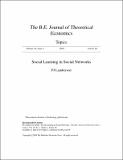Social Learning in Social Networks
Author(s)
Lamberson, Peter John
DownloadLamberson-2010-Social Learning in Social Networks.pdf (1.318Mb)
PUBLISHER_POLICY
Publisher Policy
Article is made available in accordance with the publisher's policy and may be subject to US copyright law. Please refer to the publisher's site for terms of use.
Terms of use
Metadata
Show full item recordAbstract
This paper analyzes a model of social learning in a social network. Agents decide whether or not to adopt a new technology with unknown payoffs based on their prior beliefs and the experiences of their neighbors in the network. Using a mean-field approximation, we prove that the diffusion process always has at least one stable equilibrium, and we examine the dependence of the set of equilibria on the model parameters and the structure of the network. In particular, we show how first and second order stochastic dominance shifts in the degree distribution of the network impact diffusion. We find that the relationship between equilibrium diffusion levels and network structure depends on the distribution of payoffs to adoption and the distribution of agents' prior beliefs regarding those payoffs, and we derive the precise conditions characterizing those relationships. For example, in contrast to contagion models of diffusion, we find that a first order stochastic dominance shift in the degree distribution can either increase or decrease equilibrium diffusion levels depending on the relationship between agents' prior beliefs and the payoffs to adoption. Surprisingly, adding more links can decrease diffusion even when payoffs from the new technology exceed those of the status quo in expectation.
Date issued
2010-08Department
Sloan School of ManagementJournal
B E Journal of Theoretical Economics
Publisher
Berkeley Electronic Press
Citation
Lamberson, P. J. “Social Learning in Social Networks.” The B.E. Journal of Theoretical Economics 10.1 (2010): n. pag.Copyright c2010 The Berkeley Electronic Press
Version: Final published version
ISSN
1935-1704